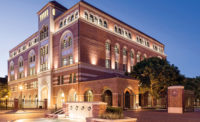Peter Nosler is a student of innovation. When the physics grad followed his father and grandfather into the construction business more than 40 years ago, he continued to nurture the drive to learn, invent and improve. This “always growing” philosophy applies to him, those around him and his vision of the industry.
“Curiosity is one of Peter’s most notable characteristics. He is driven to learn,” says Doug Woods, who teamed up with Nosler and Ron Davidowski in 1990 to form DPR Construction—a company that focuses on meeting the needs of the fast-growing technology sector in Silicon Valley.
Nosler is generous with the results of his intellectual inquiries, adds Woods. “He encourages those around him to learn and then pushes them to share what they’ve learned to make everyone better at what they do,” he says.
DPR—named for the first letter of each founder’s first name—adopts the think-different approach of the companies it works for—Applied Materials, Sun Microsystems, Genentech, Pixar—and applies it to both the projects it is working on and the people it hires to do the work.
“Peter had the vision to create something unique,” says Hugh Rice, senior chairman with FMI Corp. “He thought that how construction companies interacted with customers was too combative and adversarial.” Instead, Nosler created a team-oriented environment that focused on people first. “DPR spent more time culture-building than any other company I have seen. It was very successful,” he adds.
To that end, the founders brought in the author Jim Collins, then a professor at Stanford University Graduate School of Business, who helped the team build the company with a mission statement and set of core values that include always moving forward, learning and advancing standards.
“This [learning] mind-set and behavior has spread throughout our organization and into our project teams and everything we do to serve our customers and their facility needs,” says Peter Salvati, a coworker at DPR who nominated Nosler for the Legacy Award.
DPR offers 120 hours of training per employee per year. Training can take the form of a 12-hour course on making presentations or a four-day inhouse workshop on problem solving.
Both Woods and Davidowski say they have learned patience from Nosler—how to slow down and listen and allow others to resolve issues on their own.
From the beginning, the company grew quickly and became known for working on challenging projects: the KLA-Tencor Corp. Corporate Campus in Milpitas, the Stanford University Paul Allen Center for Integrated Services and the Skywalker Technical Building in Marin.
Nosler calls high-tech projects “the most fun,” because they require people to constantly think outside of the box for solutions.
“They’re challenging and complex,” he says. “They keep people who are passionate about building excited to come to work every day.”
These projects require tools beyond hammers and backhoes. In the early years of the company, one of Nosler’s nicknames was “Dr. Science” because he was always looking for ways to improve processes.
Now Nosler is focusing on his legacy outside the company. He leads the DPR Foundation to support construction in under-resourced communities and career and education guidance for children. Based on employee recommendations of what organizations are having an impact, the company has invested more than $10.1 million and 100,000 hours of volunteer time. He is dedicated to giving back to organizations such as the Boys and Girls Club and the Parkinson’s Institute, where he is vice-chair.
“DPR’s commitment to ‘build great things” extends far beyond our offices or customers—we strive to go into the communities where we work and live,” Nosler says.





Post a comment to this article
Report Abusive Comment